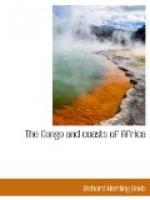At Thysville the railroad may have opened a hotel, but when I was there to hunt for a night’s shelter it turned you out bag and baggage. The French officers decided to risk a Portuguese trading store known as the “Ideal Hotel,” and the missionaries very kindly gave me the freedom of their Rest House. It is kept open for those of the Mission who pass between the Upper and Lower Congo. At the station the young missionaries were met by two older missionaries—Mr. Weekes, who furnished the “Commission of Enquiry” with much evidence, which they would not, or were not allowed to, print, and Mr. Jennings. With them were twenty “boys” from the Mission and, with each of them carrying a piece of our baggage on his head, we climbed the hill, and I was given a clean, comfortable, completely appointed bedroom. Our combined chop we turned over to a black brother. He is the custodian of the Rest House and an excellent cook. While he was preparing it my boys spread out my folding rubber tub. Had I closed the door I should have smothered, so, in the presence of twenty interested black Baptists, I took an embarrassing but one of the most necessary baths I can remember.
There still was a piece of the ice remaining, and as the interest in the bathtub had begun to drag I handed it to one of my audience. He yelled as though I had thrust into his hand a drop of vitriol, and, leaping in the air, threw the ice on the floor and dared any one to touch it. From the “personal” boys who had travelled to Matadi the Mission boys had heard of ice. But none had ever seen it. They approached it as we would a rattlesnake. Each touched it and then sprang away. Finally one, his eyes starting from his head, cautiously stroked the inoffensive brick and then licked his fingers. The effect was instantaneous. He assured the others it was “good chop,” and each of them sat hunched about it on his heels, stroking it, and licking his fingers, and then with delighted thrills rubbing them over his naked body. The little block of ice that at Liverpool was only a “quart of water” had assumed the value of a diamond.
Dinner was enlivened by an incident. Mr. Weekes, with orders simply to “fry these,” had given to the assistant of the cook two tins of sausages. The small chef presented them to us in the pan in which he had cooked them, but he had obeyed instructions to the letter and had fried the tins unopened.
After dinner we sat until late, while the older men told the young missionaries of atrocities of which, in the twenty years and within the last three years, they had been witnesses. Already in Mr. Morel’s books I had read their testimony, but hearing from the men themselves the tales of outrage and cruelty gave them a fresh and more intimate value, and sent me to bed hot and sick with indignation. But, nevertheless, the night I slept at Thysville was the only cool one I knew in the Congo. It was as cool as is a night in autumn at home. Thysville, between the Upper and the Lower Congo, with its fresh mountain air, is an obvious site for a hospital for the servants of the State. To the Congo it should be what Simla is to the sick men of India; but the State is not running hospitals. It is in the rubber business.




